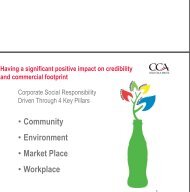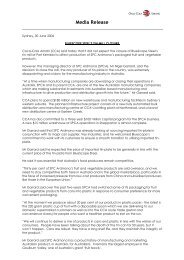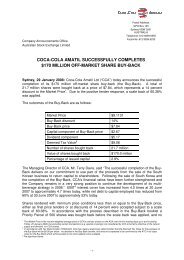2006 Sustainability Report - Coca-Cola Amatil
2006 Sustainability Report - Coca-Cola Amatil
2006 Sustainability Report - Coca-Cola Amatil
Create successful ePaper yourself
Turn your PDF publications into a flip-book with our unique Google optimized e-Paper software.
Community<br />
Principles<br />
• We support initiatives and<br />
partnerships that are relevant and of<br />
value to local communities.<br />
• We emphasise the development and<br />
education of young people.<br />
• We listen to the communities in which<br />
we operate and take into account their<br />
views and aspirations in the way we<br />
conduct our business.<br />
CCA has been creating jobs and<br />
investing in local communities for<br />
decades, and we believe that<br />
responsible wealth creation is a<br />
fundamental social contribution of<br />
business. We are also committed to<br />
maintaining and improving the health<br />
and social fabric of the communities in<br />
which we operate.<br />
Community involvement is<br />
embedded into CCA’s business<br />
model and is now part of our<br />
organisational culture. It takes two<br />
forms, community investment and<br />
community engagement, and includes:<br />
our philanthropic Foundations, staff<br />
volunteering, emergency relief,<br />
donating beverages to community<br />
events, environmental initiatives,<br />
and sharing information with our<br />
neighbours in our local communities.<br />
In <strong>2006</strong> the total value of our<br />
community support across the Group<br />
was approximately $4 million, or around<br />
1% of CCA’s Group pre-tax profit.<br />
Community Investment<br />
We define community investment<br />
as supporting initiatives and<br />
partnerships that are relevant and<br />
of value to local communities.<br />
The <strong>Coca</strong>-<strong>Cola</strong> Foundations<br />
The Coke system has established<br />
Foundations in Australia, Indonesia<br />
and South Korea as the primary<br />
vehicles for driving community<br />
support in these countries.<br />
<strong>Coca</strong>-<strong>Cola</strong> Australia Foundation<br />
CCA and TCCC established the<br />
<strong>Coca</strong>-<strong>Cola</strong> Australia Foundation<br />
(CCAF) in 2001 with the mission to<br />
“make a difference to Australia's youth.”<br />
The Foundation supports National<br />
Grant partners for a maximum of<br />
three years and Community Grant<br />
partners with one-off grants out of a<br />
total pool of approximately $1 million<br />
per annum (equally funded by CCA<br />
and TCCC).<br />
The CCAF is currently supporting:<br />
• Beyond Empathy – a mentoring and<br />
leadership program designed to<br />
break the welfare cycle for young<br />
people through arts projects.<br />
• Barnardos’Adolescent Early<br />
Intervention Parenting Education<br />
Program –a new parenting<br />
education program for<br />
disadvantaged and hard to engage<br />
families with at-risk adolescents.<br />
• The Australian Literacy and<br />
Numeracy Foundation’s Remote<br />
School Project – a unique pilot<br />
project addressing some of the<br />
most pressing literacy challenges<br />
in remote Australian indigenous<br />
communities. CCA staff in our<br />
Sydney and Darwin offices<br />
donated hundreds of books to<br />
help build a library as part of<br />
the project. The Remote School<br />
Project won Best Community<br />
Project in the <strong>2006</strong> Ethical Investor<br />
<strong>Sustainability</strong> Awards.<br />
• Bluearth Institute – CCAF is<br />
supporting a longitudinal medical<br />
research project undertaken by<br />
Dr Dick Telford, Professor of<br />
Medicine at the ANU and former<br />
Head of Physiology and Applied<br />
Nutrition at the Australian Institute<br />
of Sport. The scientific study<br />
involves the taking of a number<br />
of medical, bio-mechanical and<br />
socio-psychological measures<br />
to ascertain the impact of both<br />
physical activity and sedentary<br />
living on children. The study is<br />
of more than 800 children in year<br />
one of primary school.<br />
26

















